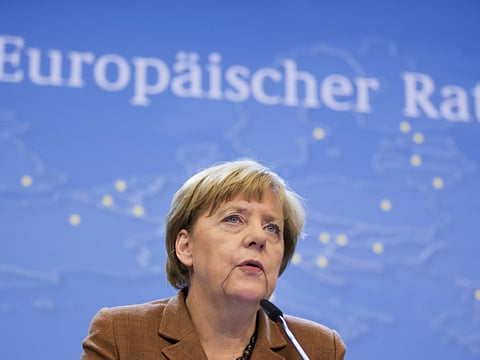Merkel paying a high price to get her way
Allowing refugees in was a good way to show that Germany needed to take better care of global problems, but the real test is till to come

European policy over the refugee crisis has been characterised by confusion. And at the heart of that confusion, it seems, is Germany and its Chancellor, Angela Merkel. Hitherto, Merkel has been regarded as a clever strategist. But her handling of this issue — open borders one day, razor wire the next — looks chaotic. Has the arch political calculator made a major miscalculation?
Merkel’s initial announcement that Germany would not cap the number of those who could apply for asylum in Germany was a real first for her, revealing not her usual pragmatism so much as a moral, almost utopian stance. Her natural inclination is towards balance and consent. This time, however, she led the debate and set the bar high.
It hasn’t gone down well in her party, her country, and not really in Europe. Within 24 hours of her announcement, the highly conservative Bavarian wing of her own CDU party was muttering about “limits” to migration. Two days later, her Minister of the Interior, Thomas de Maiziere, temporarily closed German borders without consultation. Even then, she insisted she was not ashamed “to have shown the human face of Germany”.
The fact is that the right of asylum touches Germany’s rawest nerve. Asylum is sacrosanct, an obvious product of Germany’s nationalist history. Secondly, the #thisisacoup hashtag from the night of July 13, when German Finance Minister Wolfgang Schauble let Europe take a deep look into the abyss of Grexit and European disintegration, has left deep scars. Then, Germany was portrayed as Europe’s cruel and unrelenting taskmaster.
Announcing a “culture of welcome” over the summer helped show a nicer side of Germany. This helps to explain why Merkel’s attitude to refugees wasn’t just supported by young people or the Left. Old ladies who had been forced to flee the Russians at the climax of the Second World War were shown on television baking cakes for refugees, whom they then invited in for tea.
There is a broader context, too. Merkel is trying to get Germans to accept Germany’s greater engagement in, and responsibility for, international affairs. The reality is dawning in government that a huge economic and political power such as theirs cannot remain hunkered down, like some giant Switzerland, content just to export cars. There are tangible signs of this new attitude: The foreign ministry has been restructured to make it fit for new global challenges, and the same is going on in the Defence Ministry.
Germans are either unaware of this new necessity or don’t like it. So allowing a huge number of refugees to enter the country was not a bad way for Merkel to demonstrate, even to the most blinkered voter, that Germany needs to take more care about global problems if it does not want to suffer the consequences at home.
One last incentive was demographics. As German industry has been quick to point out, the country’s population is ageing quickly, with vacancies for both skilled and unskilled workers all over the place. The fact that Frank-Jurgen Weise, currently head of the federal office for unemployment, will now also run the federal office for asylum and migration clearly signals that Germany plans to integrate asylum seekers into its labour market as quickly as possible. So there was method in Merkel’s madness.
But the real test — the successful integration of hundreds of thousands of refugees — is to come. The resources of German towns and cities are stretched; the murmuring discontent will not go away; the threat of resurgent political extremism is undeniable; and European unity is undermined. The Chancellor has never paid a higher price to get her way.
— Telegraph Group Limited, London, 2015
Ulrike Guerot is director of the European Democracy Lab



